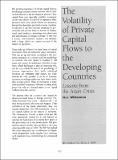| dc.contributor.author | Witteveen, H.J. | en |
| dc.date.accessioned | 2016-02-24T14:27:40Z | |
| dc.date.available | 2016-02-24T14:27:40Z | |
| dc.date.issued | 01/01/1999 | en |
| dc.identifier.citation | Witteveen, H.J. (1999) The Volatility of Private Capital Flows to the Developing Countries: Lessons from the Asian Crisis. IDS Bulletin 30(1): 151-154 | en |
| dc.identifier.issn | 1759-5436 | en |
| dc.identifier.uri | https://opendocs.ids.ac.uk/opendocs/handle/20.500.12413/9129 | |
| dc.description.abstract | Summary Eurodollar markets have a decisive role in creating liquidity, which contributed to overinvestment in emerging economies. IMF responses to the situation failed to prevent currency crises but there may be some benefit from structural adjustment in the long run. The short?term debt/reserve ratio is important as a crisis indicator, though disaster myopia is a persistent aspect of international currency markets. One should contemplate internationally coordinated restrictions on high?risk, short?term investment covering source and recipient countries. For crisis management, standardised rescheduling measures could be helpful. | en |
| dc.format.extent | 4 | en |
| dc.publisher | Institute of Development Studies | en |
| dc.relation.ispartofseries | IDS Bulletin Vol. 30 Nos. 1 | en |
| dc.rights.uri | http://www.ids.ac.uk/files/dmfile/IDSOpenDocsStandardTermsOfUse.pdf | en |
| dc.title | The Volatility of Private Capital Flows to the Developing Countries: Lessons from the Asian Crisis | en |
| dc.type | Article | en |
| dc.rights.holder | © 1999 Institue of Development Studies | en |
| dc.identifier.doi | 10.1111/j.1759-5436.1999.mp30001013.x | en |

